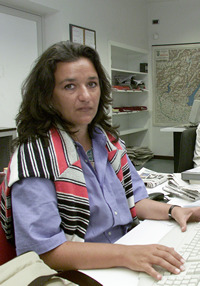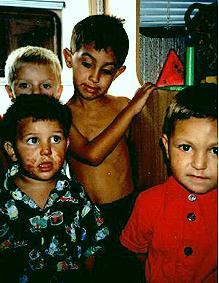One evening, Reska and Lulzim are
driving back to the camp. They turn the corner and suddenly see the blue
lights of the police. An enormous spotlight is pointing at the camp. A
policeman stops the machine and makes them open the luggage compartment.
Reska asks "what is happening?" The policeman
answers laughing: "nothing, a baby has disappeared."
Calcinato is a foggy industrial town near
Brescia (where Bajram often works). An Italian lady calls the police, saying
she had left her three-year-old child for a few minutes in the car, "in
his baby chair tied to the back seat." When she came back, she said, the
child was no longer there. That, in full, was the news: no evidence of
any kind pointed anywhere.
Here is what Corriere della Sera, one
of Italy's main dailies, on December 18th, 1999, had to say:
"Whoever took the child away also
ransacked the drawer on the dashboard. Gypsies? […]. Last September, a
grandmother from Toscolano Maderno had surprised a nomad holding her twenty-month
old grandchild in her arms, just picked up from the garden of their home.
'I screamed at the top of my breath, and that woman let go', says Bruna
Amolini. Far sadder is the story of Fabio Chele, kidnapped in 1962 on the
threshold of his house at Vobano, also near Brescia. Fabio was only
one at the time, and was found thirteen months later in Sardinia, in a
Gypsy camp."
The piece was signed by Nunzia Vallini,
a name well worth remembering.

Nunzia Vallini
The supposed theft in the dashboard becomes
evidence against the "Gypsies": after all, they are supposed to be thieves
by nature. There are two other decisive bits of evidence, so decisive that
Ms Vallini does not even consider any alternative hypothesis. The first
is that a Rom woman is supposed to have picked up a Rom child some time
in the past, or rather to have "picked" the child up from a garden. Now,
if a woman sees a child lost in the street, a child which may have
slipped out of a garden, it is not really strange to imagine that she might
pick the child up and start looking for the mother. But Rom women are not
Rom, if they pick a child up, it is to snatch them, as if they did not
have enough children of their own.
It is a fact that the non-Rom have always
kidnapped Rom children. The town government of Turin (a centre-left coalition)
recently persuaded the Minors' Court to "declare adoptable" some Rom children
who have both parents; thousands and thousands of Rom children have been
"adopted" or put in institutions around Europe against their will and that
of their parents. As a child, Reska herself was just saved in time by her
father from being abducted by a gang of social workers in Gorizia.
In any case, after the grandmother from Toscolano
Maderno who saved her granddaughter from the risk of being cradled against
a dark Rom breast, Ms Vallini provides final proof. 37 years ago, a child
seems to have been seized by "the Gypsies." Now, I know nothing of this
case. However the same page of Corriere della Sera tells us that
2,412 children were carried off in Italy in 1997 alone. These statistics
seem wildly exaggerated, but even if we make an average of just 1,000 a
year, this means that "Gypsies" are guilty of one abduction every 37,000
(equal to 0.003%; of course this means that 99.997% of kidnappings
were carried out by non-"Gypsies").
Luckily, the police were more reasonable
than Nunzia Vallini. On December 19th, Corriere della Sera had a
slightly different title from the day before: "I killed my child, He was
sick: Brescia, shocking confession by little Giorgio's mother."
Corriere della Sera, so quick in launching
criminal accusations against "the Gypsies", treats the killer mother in
a much more human fashion. "I did it out of love - the woman says. I couldn't
live with the idea of him growing up differently from others". The mother
also asks, "what will they think of me?" One wonders what readers of Nunzia
Vallini's article will think of the Roma. In any case, the newspaper did
not offer one word of apology for what they had published the day before.
By the way, it was not the first time the mother had done something strange
- a few months before, little Giorgio had been thrown into a canal, and
had been saved by an Albanian.
You are welcome to use this article
on condition that you put the whole text of "Collateral Lives" on your
website and provide a link to http://www.kelebekler.com/
